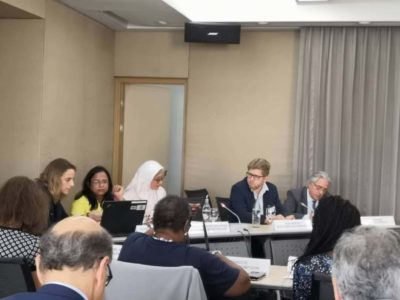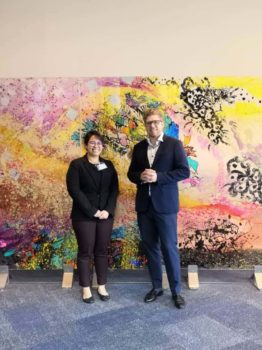Do-it-yourself (DIY) Biology working group co-lead Bart Kolodziejczyk (Australia) and the group’s external research assistant Khalisah Zulkefli recently took part in a preparatory workshop meeting on Science, Technology and Innovation (STI) for the United Nations Sustainable Development Goals (SDGs). The workshop was held at the UN Economic and Social Commission for Asia and the Pacific (UN ESCAP) building in Bangkok, Thailand, from 27 February to 1 March 2019.
This three-day workshop was collaboratively organized by UN ESCAP, the United Nations Department of Economic and Social Affairs (DESA), and the United Nations Conference on Trade and Development (UNCTAD). The aim was to prepare for the 4th annual Science, Technology and Innovation Forum in May 2019, and specifically discuss emerging issues, exchange experiences and share knowledge and views on the impact and effect of STI for SDGs #4, #8, #10, #13 and #16.
The first day of the workshop (27 February 2019) was based mostly on multi-session discussions on the ‘STI challenges and solutions for the selected SDGs’ (Session 2). Day 2 (28 February 2019) involved sessions on leveraging indigenous and traditional knowledge on their relevance for achievement of the SDGs (Session 3), the impact of new and emerging technologies on the SDGs (Session 4) and the discussion on the summary findings on the Technology Facilitation Mechanism (TFM) since 2015 (Session 5). Day 3 (1 March 2019) involved sessions on discussions on STI roadmaps incorporating SDGs and their implications for policymaking and capacity building of the Member states (Session 6), while the last session of the workshop discussed gender and STI (session 7).

Bart was a panelist for Session 3, where he shared his views and experience from his role as founder at Scientists in Residence in Australia on how to harness and merge traditional and indigenous knowledge with the current technologies and align them with the SDGs.
 Both Bart and Khalisah Zulkefli were on the panel for Session 4 to deliberate the impact of new and emerging technologies on the SDGs, where they discussed the role of hydrogen as a source of energy, the dawn of a gene editing era, and the role that the DIY Biology field has on the issue of accessibility of these new technologies.
Both Bart and Khalisah Zulkefli were on the panel for Session 4 to deliberate the impact of new and emerging technologies on the SDGs, where they discussed the role of hydrogen as a source of energy, the dawn of a gene editing era, and the role that the DIY Biology field has on the issue of accessibility of these new technologies.
